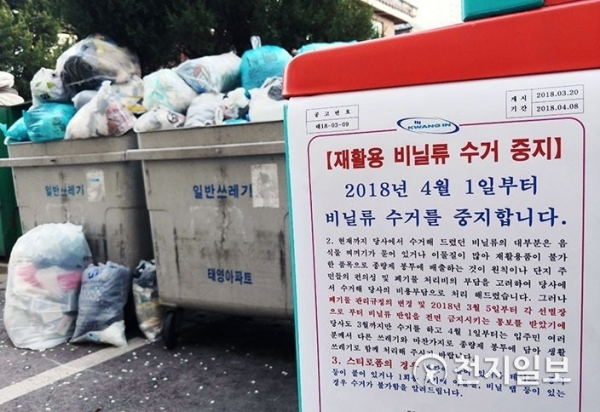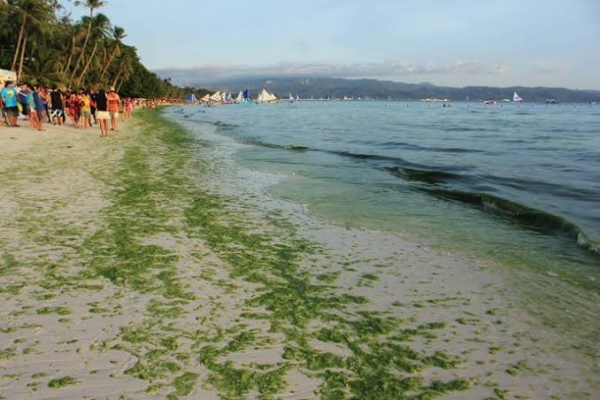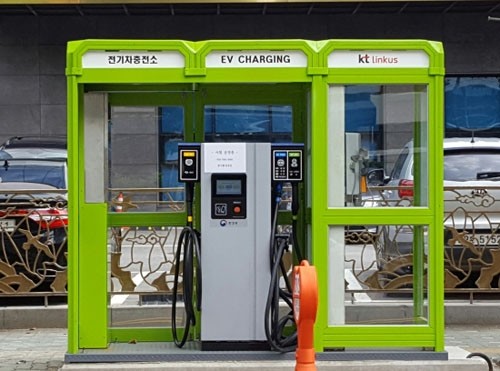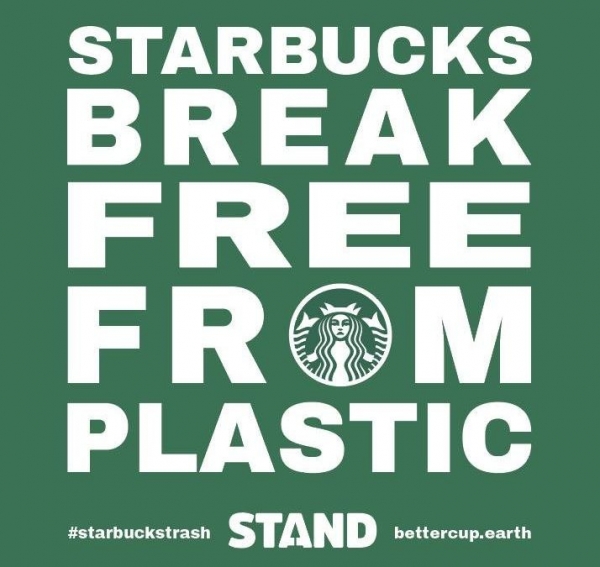
These days, we can only use disposable cups for takeaway at a café. Also, there are no more plastic straws in many cafés. These situations are what we are experiencing right now. Why do we have to follow these rules? Are environmental problems still other people’s affairs? ST discusses current worldwide problems regarding the environment, and how to save the environment. ................................................ Ed

“Around 95% of the world population breathes foul air.”; “One out of six people dies from diseases related to pollution.” One can easily see these kinds of headlines after searching for the keyword “pollution.” The problems caused by pollution are always mentioned as an unsettled, continuous issue. Despite various struggles, pollution is getting worse each day because it now threatens not only the ecosystem, but also the existence of mankind. “The Lancet Commission on pollution and health,” which consists of 47 world-famous environmental experts, clarified that about 9 million people per year reach premature death due to diseases related to pollution. This means that one out of six people died early because of pollution. They also stated that the number of deaths due to pollution is three times as much as the number of deaths including acquired immune deficiency syndrome (AIDS), tuberculosis, and malaria. It is also 15 times as much as the number of deaths due to numerous cases of violence including war. As pollution has a direct influence on the ecosystem and human beings, ST will reveal its true nature and introduce how we should prepare for the future both individually and socially.
- Recycling crisis

Recycling crisis refers to the unexpected case in 2018 when most of the recycling, sorting, and collecting enterprise refused to pick up trash. This resulted from what happened in China. Developed countries, such as USA and the European Union (EU), handled most of their recyclable waste by exporting to China. Meanwhile, China, the biggest waste importing country, imported around 730 tons of plastic waste in 2016, about half of all the plastic waste in the world. In this situation, China regulates 24 recyclable wastes, such as plastic, vinyl, and fiber, as importing prohibited goods in 2017. For this reason, EU stated: “We’ll recycle all plastic wrappers and prohibit disposable cups.” USA and Australia decided to make the best use of their own landfill and export the rest of their waste to other Asian countries. The waste of USA and EU were exported to Korea by collapsing the price of domestic recyclable waste. The problem is that Korea did not have any measures. The price of waste paper dropped from 130 won per 1 kg in 2017 to 90 won in 2018, while the price of plastic dropped from 319 won per 1 kg in 2017 to 257 won in 2018. A recyclable waste collecting enterprise usually has a contract with each apartment’s office and women society, and handles all plastic, paper, vinyl at the same time. Although vinyl and polystyrene make no profit, plastic and paper make profit. However, the price of paper has collapsed and the companies declared boycott. At last, the Ministry of Environment
established measures. They consulted with the waste collecting enterprise and decided to collect waste ordinarily. However, this kind of measure cannot be the fundamental measure. China decided not to import 16 kinds of solid waste from 2019 any longer. Most of our solid waste from home appliances that are worth around two hundred million dollars were exported to China. Korea should be concerned about recyclable waste and solid waste. For this reason, correct segregation can be the solution. First, vinyl and plastic, which are the biggest problems, have to be washed clean when they are separated. Second, paper pack and plastic bottle have to be separated without contents and they should be squeezed. If there are foreign substances, they have to be separated in a standard plastic garbage bag and not a recycling bin. Paper, such as newspaper, should be separated dry. Glass bottle should be classified according to the material used for its cap and bottle when separated. There are already these waste separation methods but the education and promotion of the Ministry of Environment is not enough. In order to prevent solid waste crisis following recycling crisis, individual and social effort are deemed necessary.
- Boracay Island


According to the Philippine government’s policy, Boracay Island was closed up for 6 months effective on April 26, 2018. Boracay Island, which is located in the northwest direction of Panay Island, is one of the most famous tourist attractions in the world. It has played a very important role as a tourist attraction, as approximately 2 million tourists visited the island in 2017 alone. This tour business also allowed the residents of the island, around 1.9 million people, to make a living. However, due to the severe pollution, the Philippine government and the environmental office decided to shut down all the business related to tourism for 6 months. They also stated that they are looking for specific ways to improve the environment and maintain the facilities properly. According to the government, the two main environmental problems in Boracay Island are the garbage all over the streets and the lack of sewage system. These almost destroyed the five wetlands in the island, thereby resulting in severe pollution. Last July, President Duterte actually depicted Boracay Island as an “island of garbage disaster.” Once it was known for its beautiful ecosystem and a way of living, it now became a “garbage island.”
- Microplastic

Microplastic refers to plastic under 5 millimeters in size like various particle, piece, fragment, grain, and fiber. It is divided into the first and the second microplastic. The 1st microplastic is made into a small size at first, while the 2nd microplastic is made into a big size at first but becomes small artificially or inartificially. Microbead is an example of 1st microplastic. It is particle size at 1 mm and made of a petrochemical ingredient like polypropylene. It is used in cosmetics, soaps, and toothpaste. Microplastic can be hazardous to humans. At first, the 1st microplastic like microbeads flow into the sea without filtering at the sewage treatment plant. Furthermore, plastic products like plastic bottles and scrubs become 2nd microplastic when it flows into the sea and breaks into pieces by the waves. Planktons eat these plastics by mistake. These planktons are eaten by other fishes. Finally, these fishes come to our dining table following the food chain. The problem is that microplastic can be divided into nanometer. These nanometer-sized microplastics have increased surface than before it is divided. It means that it can absorb toxic materials easily and be absorbed into the human body through the lymphatic system. For this reason, the movement to prevent microplastics is suggested. The world is moving toward reducing microbeads (1st microplastic). The United States passed a microbeads purity coast bill that prohibits the sales and distribution of detergent containing microbeads. In addition, Taiwan, Canada, Australia, and the United Kingdom (UK) push forward the regulation of microbeads. Korea joined Green Peace’s microbeads ban campaign by announcing non-governmental organization (NGO) co-signatures. Moreover, from 2017 the production and import of all products with microbeads was banned and the sales of these products made before that time was banned. Both the regulation at government and enterprise level are active. Enterprises like Loreal and P&G have stopped using microbeads by the end of 2017. In order to reduce the 2nd microplastic, biodegradable plastic is presented. It is a type of plastic that can be decomposed by microorganism in water, earth and CO2. It has the advantage of reducing environmental pollution by faster biodegradation while maintaining the plastic’s function.
- Green car

Green cars are currently focused on the environment and future generation. The biggest automobile company Volkswagen presented that they will stop producing diesel and gasoline vehicles by 2040, and focus on producing electronic cars in 2018. Also, Changwon City, Korea supported the subsidy of 19 million won to electronic cars in 2018. Green car refers to a car that reduces environment pollution by using hydrogen or electricity, unlike normal cars using diesel or gasoline. Green cars can be divided into electricity and hydrogen depending on moving energy source. Electric cars can be divided into electronic vehicle (EV), hybrid electronic vehicle (HEV), and plug-in HEV (PHEV). EV refers to a car that operates its motor by only battery. EV feature nonexhaust and less noise. HEV means refer to the car that combines electricity car with diesel and gasoline car as seen in the word “hybrid.” It uses both fossil fuel and electricity. HEV has better fuel efficiency than the usual gasoline car because it can charge the battery automatically by using the rotator power when it slows down. PHEV means plug-in HEV with the same operation as of HEV. The feature is different with HEV as it increased battery capacity and the ability to charge battery by plugging in from outside. Also, it can drive as an electric car mode and HEV mode. At this time, driving in HEV mode can lead to charging the battery. In addition to the electric car, hydrogen vehicle is one of the most popular green cars. Fuel cell electric vehicle (FCEV) refers to a car running on hydrogen fuel cell that produces electricity using hydrogen and oxygen as fuel. FCEV is fitted with a super charger motor, which is a kind of turbo charger, and it emits amounts of oxygen to produce electricity. At this time, this oxygen pass air filtration, and it filters out harmful substances like fine dust.

In order to solve numerous kinds of environmental problems, socially agreed efforts are essential. First, the government should make efforts to obtain sustainable development, which refers to the organizing principle for meeting human development goals while at the same time sustaining the ability of natural systems to provide the natural resources and ecosystem services upon which the economy and society depend. UN is confronting problems with sustainable development goals (SDGs). For SDGs, Korean government has been implementing various policies. In May, the Department of Environment made an announcement on “policies related to recyclable wastes.” From August 2018, cafe and fast-food restaurants are banned from using disposable cups inside the restaurant. They can be fined up to $2,000 if violated. The government is planning to deduct half the amount of recyclable garbage until 2030. Also, world-class organizations are making efforts to protect the environment. These are also the result of the consumers who are aware of environmental problems. For example, Starbucks stopped using plastic straws and started using straws made of paper. They have been supplementing the problems of paper straw for 2 months of test-operation and conducted a survey about the color of the straw. From 26th November 2018, Starbucks declared that they are going to use paper straws only. Starbucks also introduced “drinking lids.” Drinking lids are the lids that are designed to drink easily even without straws. Nike and Burberry also made plans for “Make Fashion Circular” to recycle products and raw materials. McDonald’s is also planning to supply paper straws instead of plastic straws starting from 2019. Coca-Cola decided to use 100% bio bottles and Disney decided to get rid of disposable materials from every place run by them. Adidas planned to stop using new plastic for the new production of clothing and shoes, and use only recycled plastic. Also, many celebrities took the lead of supporting environment protection to persuade people to do the same.

For example, Leonardo DiCaprio began his career as environmentalist by opening a foundation named after him. This foundation is working on projects in about 40 countries. He also made a speech in UN about climate change and spent 112 billion won for 20 years. Korean actor Ryu Jun-yeol is participating in the Greenpeace Environmental Campaign for 3 years. He participated in the North Pole preservation campaign by donating his voice and reducing plastic campaign by donating 10 million won.


Besides social dimensions, individuals can also make efforts to protect environment. For example, precycling, combination of word ‘pre’ and ‘recycling’ is getting attention as a way to prevent making garbage. As the waste from packing materials pollutes the environment, campaigns started to reduce such waste throughout the world. For instance, German grocery “Original Uncoverpack” display their products without packaging, so that the consumers can bring their own packaging. Also, Korean groceries, including Home Plus, are lending or selling shopping bags instead of disposable paper bags. There are various ways for us to protect the environment and take the advantages. Carbon scoring system is a program that encourages people to lessen the emission of greenhouse gases by giving them points according to the amount that they cut on the usage of electricity, water, and so on. By using the point, one can cash, voucher, and other advantages returned. Furthermore, the green point system is a good way to protect the environment. If one picks up garbage or takes them back to the national parks, one earns a green point and gets various gifts. Last, one can protect the environment with just a small effort in one’s own house. When using air conditioner, one should use the “dehumidification” and “air blast” function adequately. In addition, the filters should be kept clean in order to lessen the greenhouse gases. Refrigerators should not be opened too often, and one can put plastic curtains in the refrigerator to lessen the electricity consumption and keep the food fresh. These personal solutions are important, but social solutions are more essential. Leonardo DiCaprio said in a UN summit address following. He said that environmental pollution cannot be solved by changing the light bulb or driving a hybrid car. That is to say, it is far beyond the scope to be solved by individual actions. It is time for industry and governments around the world to take decisive action. All governments and corporations in Korea and around the world must endeavor to prevent environmental pollution and achieve sustainable development.
Hong Su-min [ST Reporter]
sumin5400@soongsil.ac.kr
Kim Ki-bum [ST Reporter]
rlqja25@soongsil..ac.kr


